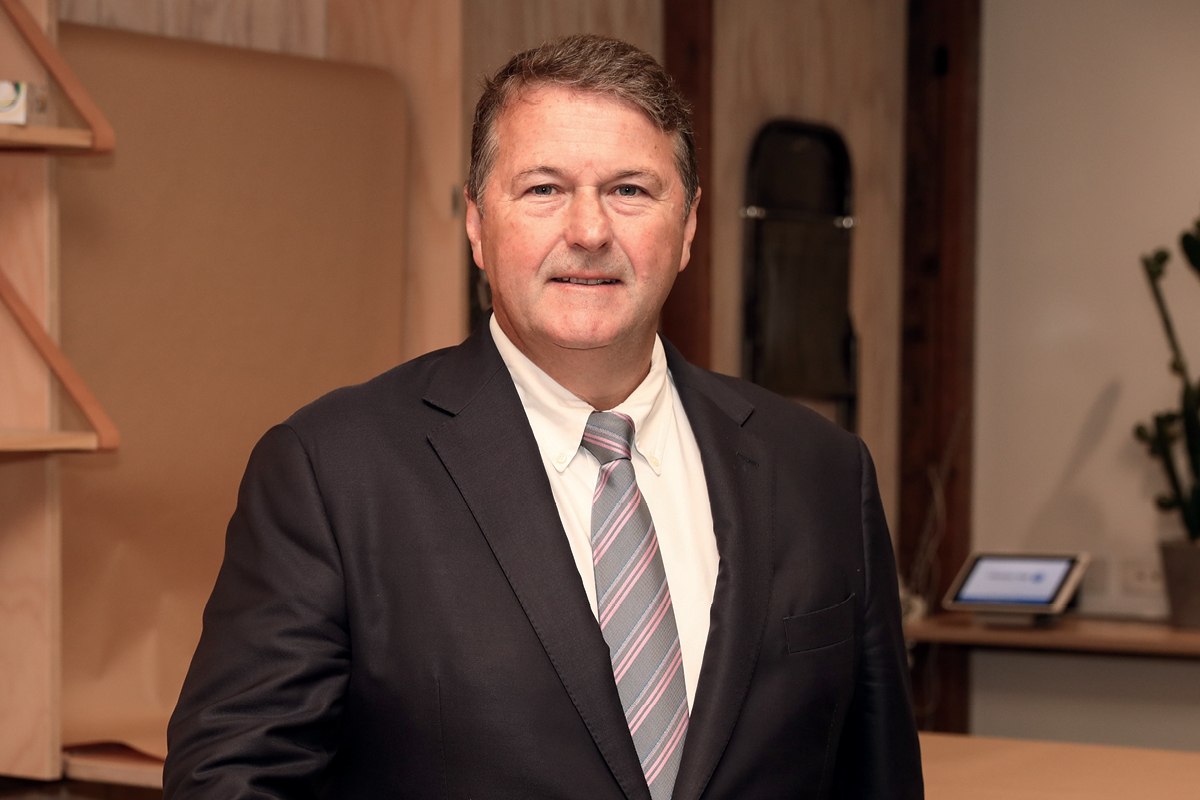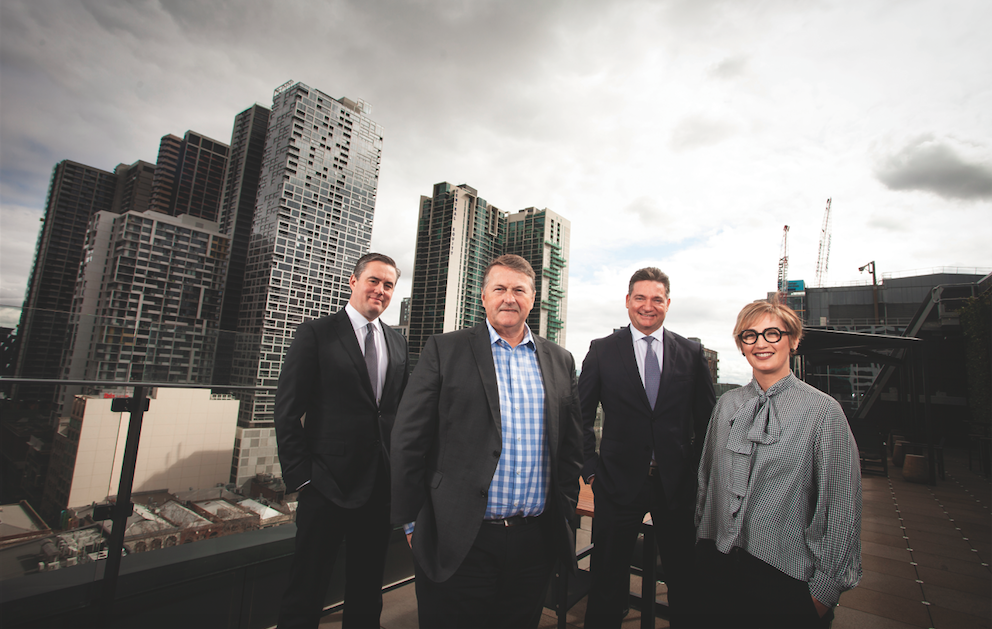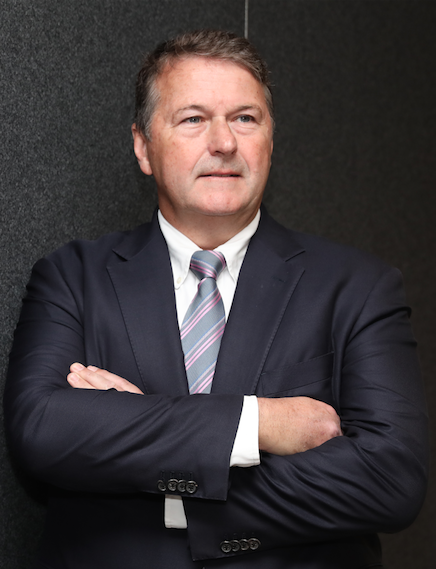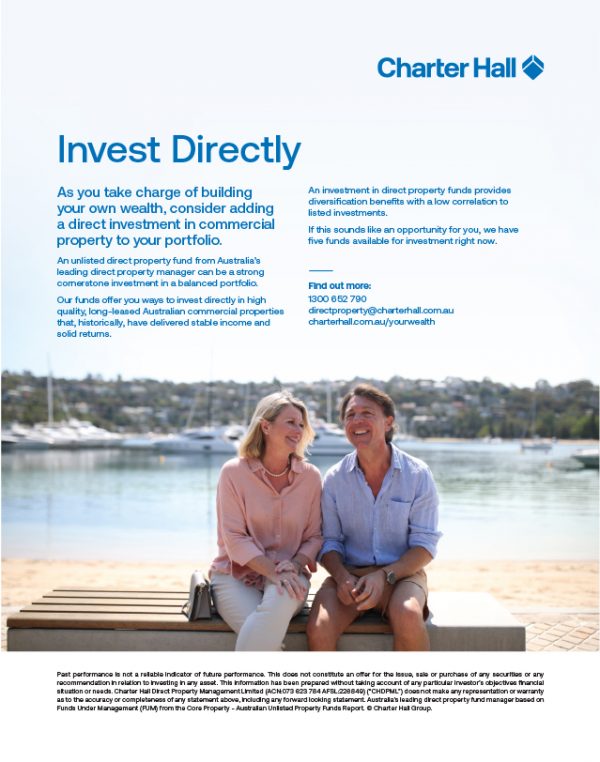Flipping a burned-down house isn’t a normal pastime for a teenager, but for David Harrison, Managing Director and CEO of Charter Hall Group, his career path was never going to be ‘normal’.

In fact, sharing a project like this with his dad was simply a natural progression from a childhood spent manning open days and site visits for his parents’ real estate developments.
Real estate is in David’s blood, and it comes as no surprise he’s made a successful career out of it, with astute leadership and strategic direction playing a significant role in the success that Charter Hall Group enjoys today.
Charter Hall has a finger in almost every property-related pie, and operates across property funds management, development, property investment banking, property management and property investment.
With just under A$40 billion in assets under management, consistently delivering outperformance is a hallmark of the company, and there is nothing serendipitous about this.
Charter Hall has rewritten the game plan on property investment and funds management, and in doing so has offered confidence to both institutional and ‘mum-and-dad’ investors.
Grassroots beginnings
In what he describes as a “real estate family”, David’s parents were both real estate developers and auctioneers in Nabiac on the North Coast of New South Wales. It wasn’t unusual for David to be working at the sales sites or learning how to be an auctioneer.
“Dad gave me the chance to do some small property deals when I was a teen,” he remembers fondly. “I got a taste for real estate early.” Developing this business acumen at a young age set the scene for David’s future in the industry.
In fact, his pathway to his role as CEO of Australia’s largest property fund manager is a rich narrative of opportunities and smart business savvy. Following his parents’ lead, David undertook a degree in Land Economics from the former Hawkesbury University, now part of University of Western Sydney, before winning a scholarship at Raine and Horne Commercial.
It was here that he started his career as a commercial real estate valuer. However, it wasn’t long before David realised that he was more interested in capital markets and investment transactions, so moved into investment sales.
Teaming up with Hong Kong-based real estate group First Pacific Davies, David was instrumental in acquiring Raine and Horne Commercial. The company ultimately ballooned from 20 to 800 employees before selling to Savills Australia in 2001.
In 2004, David joined Charter Hall, a small private real estate fund manager. “Charter Hall had been predominantly focused on development or opportunistic funds for Australian Super Funds,” he recalls. “It was a relatively small but profitable syndication business.”
“Within six months of starting, we put together a property portfolio, stapled it to the private fund management business and completed an IPO on the stock exchange in June 2005 as Charter Hall Group,” explains David proudly.
“As a listed group, our goal was to provide a differentiated offering to the institutional market that hadn’t previously existed.”
Co-investing is king
With more than 29 years’ experience in property investment and funds management, Charter Hall is one of Australia’s leading fully integrated property groups.
The company manages a total portfolio of over 1,100 properties including industrial properties, retail centres, premium office buildings and early learning centres, which are home to blue-chip tenants ranging from government to major corporates.
The company is also the largest landlord of Woolworths and Wesfarmers by rent, who are also significant users of industrial space as well as the biggest tenants in its grocery-anchored shopping centres.
Early on, David and his partners recognised that Charter Hall needed a balance sheet so it could use that capital to co-invest with larger investors to create core capital.
“In the first 12 months we closed the biggest equity raising for a core real estate strategy with virtually no assets,” remembers David. “In early 2006 we raised A$500 million of equity from institutional investors to create the Charter Hall Prime Office Fund (CPOF).”
In fact, this was and still stands as Australia’s largest blind equity raising for a core investment fund, and is a great example of the Group using its expertise and inventive spirit.
“Our vision was to turn Charter Hall into a core investment manager and use development teams in all the sectors to add value for fund investors. This meant we’d have core funds with a little bit of alpha coming from development,” he explains.
“For us, that’s a much smarter way to develop the core real estate because it’s being done by the funds. The profits go to fund investors. As the manager we typically don’t make the profits. We are paid development management fees to buy the land, manage the development and get it leased up. But as a co-investor, we’re 100% aligned with all the investors because we’re all sharing the profits.”
“It’s a very different model from a real estate development company and I think the numbers speak for themselves,” David adds.
“This differentiation has allowed us to attract more capital than our peers over the past 15 years. What’s more, the alpha we create has allowed those funds to top their peer groups.”
I got a taste for real estate early.
Outplay, outperform
It’s often said that the gap between what’s expected and what you deliver is where the magic happens. And there is plenty of magic happening at Charter Hall with the company consistently outperforming in all key areas. The results certainly speak for themselves.

“Along with David Southon, as joint Managing Directors we took the business from A$500 million of assets when I started, to a billion by the time of the IPO in 2004,” David recalls.
“Today, we have approximately A$40 billion of assets under management, and we’re the second largest owner of real estate in the country after Westfield branded Scentre Group.”
MSCI Investment Property Database (IPD) Index tracks A$150 billion of wholesale funds in the country, and Charter Hall Prime Office Fund tops the index as the leading office fund over most periods.
Similarly the company’s industrial fund, CPIF, sits at the top in the core industrial index. “What really stands out in our performance is that, apart from two M&A deals, the majority of our growth has been organic,” David points out.
“Since we started, we haven’t changed the business strategy. Our strategy has always been to use our balance sheet to co-invest with super and pension funds, high net worth investors and mum-and-dad investors in our syndicate or Direct business.
“We’ve refined our philosophies over the past 15 years to really focus on long-lease assets, strong covenants and high-quality, resilient tenants.” In the 2019 financial year, the company reported a 34% increase in Operating Earnings to A$275 million.
It has also been a record year of equity inflows across all capital sources and transactions, which saw Funds Under Management (FUM) grow by 31%.
This was aided by the 2018 acquisition and integration of Folkstone Ltd, which added A$1.6 billion to FUM growth as well as increasing the investable universe into social infrastructure and the early learning sector.
“As a teen, and with Mum and Dad’s real estate development activities largely residential and rural, I saw firsthand the volatility in residential markets and the impact on the rural sector of natural events such as drought,” explains David.
“It actually helped pivot me towards accumulating high-quality assets that can be leased to good tenants on long-term leases to ride through short-term volatility. This is why our business is shaped the way it is.”
Manager of choice
Today, Charter Hall Group focuses on four core property sectors: office, industrial and logistics, retail and social infrastructure. The company’s successful partnership approach and consistent outperformance has positioned it as a trusted manager of choice.
David and the Executive team are prepared for what’s ahead. “We’ve ridden the growth curve, but have also got the drive, resilience and culture to see us through the tough times.”
With a whopping A$17.4 billion office portfolio, according to Adrian Taylor, Office CEO, this sector is focused on “creating a true partnership approach to deliver high-quality workplace environments”.
The industrial and logistics, and retail, sectors feature large portfolios with almost 100% occupancy rates, significant FUMs and impressive 11.8 and 6.4 year weighted average lease terms (WALE) respectively.
“In the first half of my 32-year career, sectors like industrial were not considered a core mainstream real estate sector,” suggests David.
“But now it’s front and centre and probably the most preferred of the three core sectors globally of Office, Retail and Industrial.”
According to Retail CEO Greg Chubb, the company is “curating a portfolio focused on convenience and everyday needs that provides a resilient and growing income stream for investors”.
With a focus on Woolworths and Coles anchored, convenience-based shopping centres with tremendous cross-sector tenant relationships, the company also boasts BP service stations among other assets in its extensive portfolio.
The social infrastructure business has the largest portfolio – 433 properties – and provides much needed social services that support the community and drive value for investors.
Its portfolio includes university buildings, police and justice services facilities, and the sector has a particular focus on education as Australia’s largest owner of early learning centres, partnering with more than 30 high-quality childcare operators.
With 100% occupancy levels, 10-year WALE terms and operating earnings up 20.3% in its 2019 half-year results, this sector continues to provide investors with stable and secure income and capital growth.
“The recent A$1.43 billion Telstra data centre transaction has added scale to this thematic,” adds Chief Investment Officer Sean McMahon. In addition to its property sectors, the Group has multiple sources of capital.
Charter Hall Direct manages the Group’s unlisted property funds and syndicates, and is Australia’s leading direct property fund manager of A$5.0 billion of assets.
Renowned as a property manager with the longest WALEs in the sector, long-term leases minimise the risk of vacancies and generate consistent cashflows.
“Our clients like that real estate can deliver long-term leases and income streams that match their long-term liabilities in super funds or insurance companies,” says Direct CEO, Steven Bennett.
Strategic success
Providing a differentiated experience for customers has driven the company’s growth model, whether that is managing relationships with tenants and investors or managing physical assets and investments.
“We want to not only produce sustainable returns for investors but also positive experiences for our tenants and community,” says David. “Charter Hall Group’s philosophy has always been to have negligible debt at the head stock company – we’re net zero geared.
Our view is, if we’re going to have any gearing, it should be in the funds we co-invest in and manage. “I’m passionate about the values that a real estate investment provides as a diversification for investors in times of turbulence,” David reflects.
“I think unlisted real estate will prove during this cycle exactly like it did in the GFC – it’s not market to market on a daily basis so there’s not irrational pricing up or down. It’s more reflective of its long-term cash flows.”
Active partners
Adopting a partnership model has been a vital differentiator for the company. This innovative approach typically sees the investors as a ‘club’ sitting on an investment committee with the company representatives making the decisions.
“We have been innovative in the growth of partnerships,” suggests David. “We’ve grown to be the biggest player in the net lease sector in the country. This encompasses assets that are leased to tenants on long-term net leases.”
Sometimes known as a triple net lease, the tenant is responsible for covering all costs the building may incur during the term of the lease.
It’s all about what we can do for our people, not what they can do for us.
Triple net leased properties have become popular as investment vehicles for investors looking for steady income with relatively low risk.
“Our Bunnings Wholesale Partnership is an example of this, starting from scratch six years ago to around A$1.7 billion of Bunnings-leased assets now,” David adds.
“We’ve adopted the same approach in logistics with a core logistics partnership worth a couple of billion dollars, comprising assets owned by us and two Australian super funds.”
In the past 12 months, Charter Hall has formed partnerships with BP, purchasing 50% of a freehold portfolio of 228 BP leased assets, as well as acquiring 50% of the Telstra data centre portfolio.

“These are fantastic long-term, sit-and-forget portfolios with the comfort of long-term leases and locked-in rental growth to great corporates,” says David. “Many of these have an underlying theme of unimproved or underlying land value.
We have an internal saying, ‘We want land rich investments’, meaning the land as a percentage of the investment is very high. We’ve bought portfolios where the land is 100% of what we pay, which is Nirvana in real estate terms.
“There is no other company in Australia that manages the unlisted wholesale, the ‘Mum-and-Dad’ retail, and the listed REIT space. We have a diversified source of equity and we’ve done that on purpose. At Charter Hall, our investors don’t compete with us for assets, as all the balance sheet is co-invested with our partners in the funds.
This is a major differentiator for us, and it’s resonated with offshore and domestic capital.
This has helped us grow to where we are today, the second largest owner of assets in Australia.”
“I’m personally very dedicated to our wholesale capital partners who have been supportive of us for years. I think it’s a sector that is not well understood but is a huge part of our property industry. We’ve developed excellent relationships that have been beneficial both ways as our returns across the board have outperformed benchmarks and our peers.”
The extra mile
With a strategic eye to the future, Charter Hall is preparing its portfolio to take advantage of AI, Big Data and advances in intelligent control systems. David explains: “Some years ago, we started a PropTech strategy encouraging our people and new ventures to pitch us ideas for all things PropTech.”
PropTech’ defines startups that offer technologically innovative products or new business models for real estate markets. “We’ve implemented virtual building concierges and a range of customer-friendly applications throughout all our sectors.
We’ve built a state-of-the-art facility in Melbourne with Woolworths on a 20-year lease with fully automated high-bay technology improving their inventory turnover. We’re seeing innovation in the cold storage sector moving from single level to high-bay automated technology.
“I think we’re going to see a range of changes in offices as a result of the virus, and perversely, a reverse in the trend of open-plan and agile offices towards fixed desks,” David reflects.
People factor
So, what sits at the heart of Charter Hall’s success, and what defines the essence and spirit of the organisation and team?
“If you asked any of my eight executive team or the 45 leaders under them, they’d cite the same things – Charter Hall is a progressive and diverse organisation and it’s relatively young. At 54, I’m an old bloke in our company,” he laughs. “I think our average age is 31.

“Our team also sees us as a family-oriented organisation, as opposed to larger institutional types. We’re seen as an agile, nimble growth company; we have an institutional quality but with a boutique business mentality.”
Charter Hall has adopted an innovative approach to develop its executive team with executive rotation between disciplines and sectors welcomed and encouraged.
“I say to the team, ‘When and if you leave Charter Hall, I want you to look back and know you had every opportunity to move around the company and get exposure to a broad cross-section of the property sector’,” David shares.
David publicly reinforces this at his “town hall meetings” so his people have no fear in putting their hand up to try a different role or sector. “In my view, my best executives are the ones who have had experience across disciplines and sectors,” says David.
“My team encourages movement. Even though they have to find a replacement and they lose a great team member, it’s all about what we can do for our people, not what they can do for us.
“We price real estate all the time and I say to everyone, ‘the diversity we give you is going to increase your market value to someone. If you are more valuable to someone else, then you’re more valuable to me’. It’s that simple.”
Natural born leaders
By his own admission, David is not a directing-traffic-from-his-ivory-tower leader; he’s in the trenches and leading from the front. This leadership has evolved from growing Savills and Charter Hall from humble beginnings.
“I think I was the ninth staff member at Charter Hall and now we have over 600 employees,” he says proudly.
“We’ve been able to build a really strong bench at an executive committee level, and I personally believe it’s the strongest bench of any company in the property sector.”
Succession planning is an imperative KPI for the Charter Hall Executive team. “My team know they need to build their credentials as a candidate for succession to my role.
But I also say to them, ‘You have a bigger KPI building a bench under you as a successor to your role’.
All the executive team and their leadership teams have KPIs for their annual bonuses directly related to their ability to show myself and our Chairman that they are building the bench below them for succession.
“It’s ingrained in the business and something I expect in terms of developing our talent.” From the CEO down, customer KPIs are a large component of their overall KPIs.
“This is a customer-centric business. We’ve got two sets of customers – tenant customers and investors that invest our funds. I expect my team to be intimately in dialogue with those customers,” David says.
“From my level through to the executive team, financial KPIs are no more than 50%, with the other 50% made up of customer, leadership, culture and collaboration.”
Gravitas is something that David believes is important in his role. “You can’t lead a business managing other people’s money without a reasonable level of gravitas,” he suggests.
“You need to inspire your team and give them confidence in good and bad times. You need to inspire investors who entrust you to deliver returns for them. And you need to inspire tenant customers who have the choice whether to lease our space or somewhere else.”
“I also have a ‘plus two’ philosophy. With every phone call or client interaction, once you’ve got through the subject matter at hand, you should be asking two additional things about their business that shows your interest in them,” David explains.
Giving back
In 2017, Charter Hall Group was the first Australian property company to adopt the Pledge 1% philanthropic movement.
Joining the likes of Atlassian and SalesForce, the company’s Pledge commitment donates 1% of its spaces, profits and people’s time to support community organisations and enterprises such as local charities.
“We’ve purposely structured a business that is managing other people’s capital. It’s in our DNA from the CEO and Board through to each of our 600 employees, and from that comes a social responsibility to do the right thing by the community,” says David.
“Pledge 1% is a tangible way we can invest in the communities in which we operate, so the more successful we are, the more we are able to give.”
In 2019, 67% of Charter Hall employees engaged in 378 employee volunteer days, A$775,000 was invested in community programs and services, and A$1.8 million, or 37,977 square metres of space, was utilised by community organisations.
“We’ve embedded responsibility and accountability for our Pledge commitment deep into the organisation, so recommendations from the team filter up to the Executive team,” adds Natalie Devlin, Chief Experience Officer.
For David, Charter Hall has a strong game plan with the right people, strategy and stability, and spirit, during times of uncertainty.
“I’m very proud that we’ve got a wonderful bunch in our executive team – we’ve got industry-recognised heads and leaders in their particular disciplines. This gives me and our Board a great deal of confidence in our strength at an executive level,” David enthuses.
“We’ve got a fantastic business, and the people behind it are doing an excellent job. I think it’s times like now with listed market volatility that you’re going to see experience, calmness, balance and, more importantly, relationships with large wholesale capital partners shining through.”
Proudly supported by:




